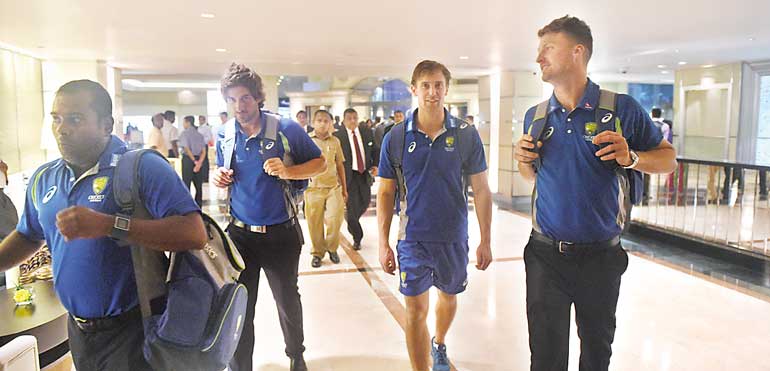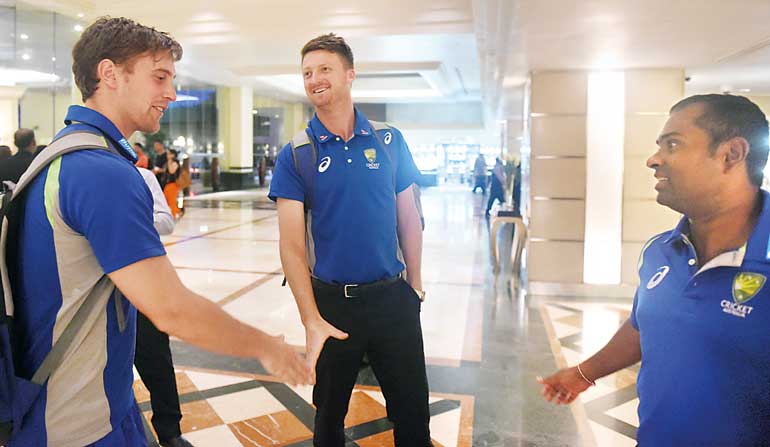Wednesday Feb 25, 2026
Wednesday Feb 25, 2026
Monday, 11 July 2016 00:00 - - {{hitsCtrl.values.hits}}

Australian cricketers Joe Burns (2L),Peter Nevill (R) and teammates arrive at a hotel in Colombo on 9 July. Australia will play Three test, five One-Day Internationals and Two T20 series matches, in Sri Lanka between 26 July and 9 September. The first Test between Australia and Sri Lanka will be played on 26 July at the Pallekele International Cricket Stadium in Pallekele - Pix by AFP

Australian cricket team manager Gavin Dovey
www.smh.com.au: Coach Darren Lehmann hopes the three-Test tour of Sri Lanka will lay the groundwork for an Australian renaissance on the subcontinent.
Australia has only the one Test win in ‘Asian’ conditions in the past decade – against Sri Lanka in Galle in 2011, which was enough to secure a series win. That has been their only series win in their past five attempts.
In what will be another hectic 12 months for the world champions, the home summer will be followed by a four-Test series in India, where they have not won since the breakthrough 2004 campaign.
Lehmann said the age demographic of Australia’s top order meant a hoped-for victory against Sri Lanka could spark a long-term surge.
“I think we have a good mix and a young group. If they have success now, that stamps you in good stead when you are going on the tours in the future. Apart from say (Adam) Voges, you have a core group there, the top six, apart from Voges, who probably could be around for five, six years,” he said.
“If they have success now, that stands them in good stead for India, Pakistan, UAE, all that coming up.”
Joe Burns (26), David Warner (29), Usman Khawaja (29) and skipper Steve Smith (27) are part of the batting unit Lehmann has major hopes for.
This will be Burns’ first senior tour of the subcontinent, while Khawaja was out of the side on the team’s last subcontinent tour, against Pakistan in the United Arab Emirates in 2014. Warner had 239 runs at 59.75 on that tour, while Smith produced 174 at 43.5.
Australia has struggled against the turning ball in the subcontinent but reverse swing could also cause problems when this latest series begins on 26 July in Kandy.
Lehmann said this was not a mental issue, rather it was because teams naturally played better at home. Winning on the road, however, has become more problematic for all nations, sparking debate over whether curators of host nations are giving their side an unfair advantage.
“It’s no different when they come out to Australia, although the wickets were quite flat when India (last) came out. You play most of your games in your home country, that’s a simple part of life,” Lehmann said.
“We just have to adjust better. We think we have done that by going a bit earlier, having an extra trial game if you like, and spending a bit more time in the country before we hit the road.”
Lehmann can also offer his own personal experience – and that was a successful one in Sri Lanka in 2004, when he was part of an Australian side which claimed a 3-0 series win.
However, what’s largely forgotten from Ricky Ponting’s first series as Test captain, and Shane Warne’s return from a year-long suspension, was that the tourists trailed after the first innings in each of the Tests. Damien Martyn and Lehmann were the stand-out batsmen – the latter amassing 375 runs at 62.5, with two tons.
“You just give them your experiences. Some of them will help players, some will have to work a different way,” he said.
“I think that’s the thing about the subcontinent. You can’t have a certain way – everyone is different. You have to be able to chop and change and oscillate between gears and sometimes you just have to hold and stay in and take the ones, and sometimes it’s tough and you have to take the game on.”